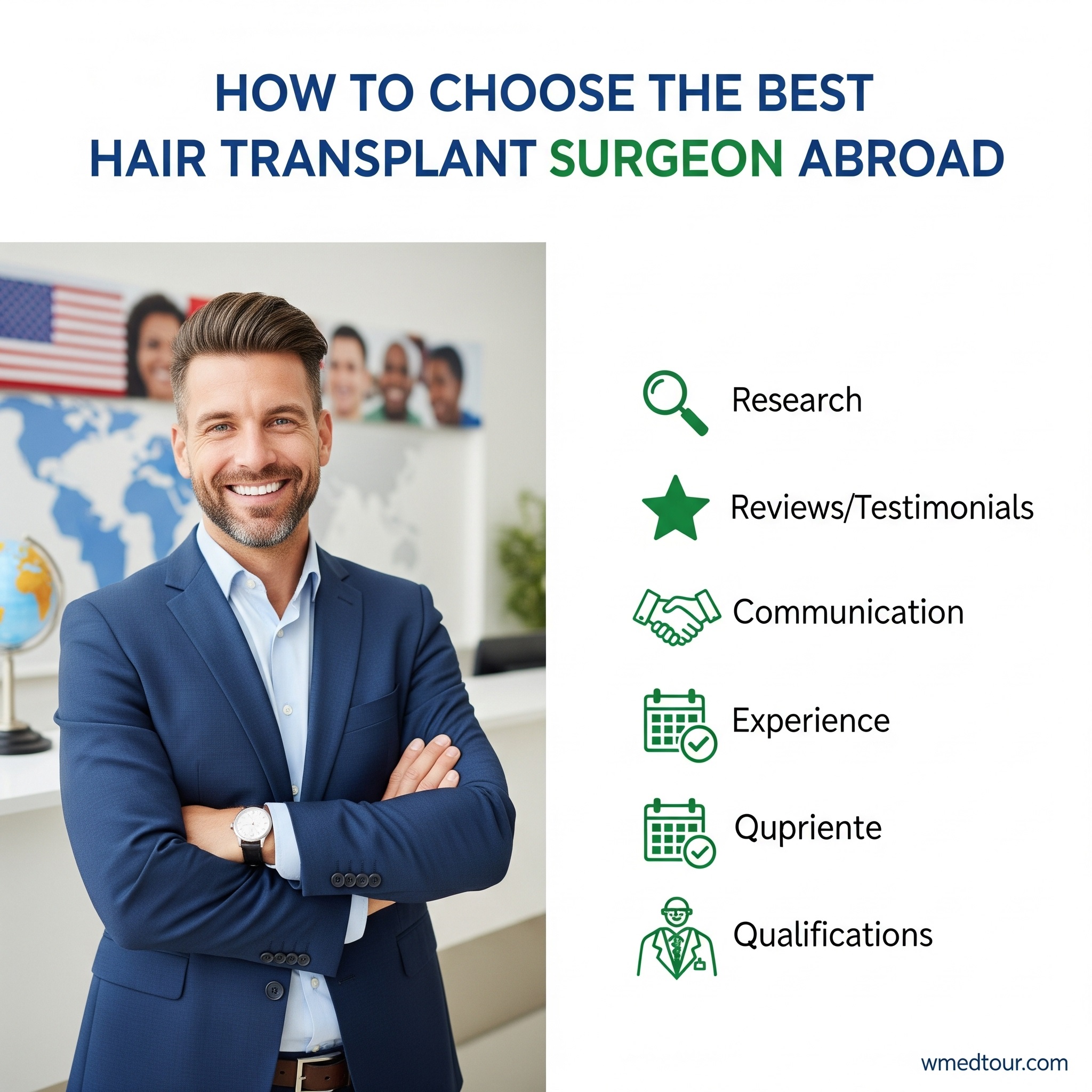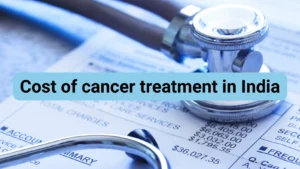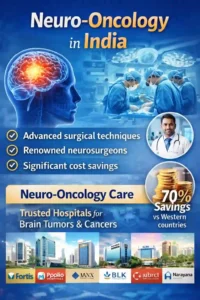How to Choose the Best Hair Transplant Surgeon Abroad
Deciding to get a hair transplant is a significant life choice. Deciding to have it done abroad? That adds a whole new layer of complexity. With countless clinics and surgeons vying for your attention, particularly in popular medical tourism destinations, it can be overwhelming to separate the genuine experts from the opportunists. While the promise of lower costs is appealing, the real value lies in a successful, natural-looking result that lasts a lifetime. So, how do you navigate this global landscape to find the best hair transplant surgeon abroad?
This comprehensive guide will walk you through the essential steps and critical questions to ask. We’ll cover everything from verifying a surgeon’s credentials to understanding the importance of aftercare. By the end, you’ll feel empowered and confident in your ability to make an informed decision for your hair restoration journey.
The Allure of Medical Tourism for Hair Transplants
The global hair transplant market is booming, and for good reason. For many, a hair transplant is a life-changing procedure that can restore confidence and a sense of self. Traveling abroad for the surgery, a practice known as medical tourism, has become increasingly popular. The primary driver is often the significant cost savings. For instance, countries like Turkey, Iran, and Hungary offer procedures at a fraction of the price of the same surgery in the US or UK.
However, it’s not just about the price tag. Many international clinics boast state-of-the-art facilities and offer all-inclusive packages that cover not only the surgery but also flights, accommodation, and ground transportation. This can make the entire process feel like a seamless, stress-free experience. But, as with any major decision, it’s crucial to look beyond the flashy brochures and glossy websites to ensure you’re making a safe and smart choice.
The Critical First Step: Verifying Credentials and Expertise
This is arguably the most important part of your research. A beautiful clinic or a low price means nothing if the person performing the surgery lacks the necessary skills and qualifications. The hair transplant field has a low barrier to entry in some countries, meaning almost any doctor with a general medical license can claim to be a “hair transplant specialist.” This can lead to disastrous, irreversible results. Therefore, you must be a detective.
Start by verifying if the surgeon is certified by a reputable international or national board. The **American Board of Hair Restoration Surgery (ABHRS)** and the **International Society of Hair Restoration Surgery (ISHRS)** are two of the most respected organizations in the field. Membership or certification from these bodies indicates a surgeon’s commitment to high standards, ethical practices, and ongoing education. It’s a huge green flag.
Additionally, investigate the surgeon’s experience. How many years have they been performing hair transplants? How many procedures do they do annually? A surgeon who specializes exclusively in hair restoration surgery and has a long, proven track record is much more reliable than a general plastic surgeon who performs a variety of cosmetic procedures. A specialist understands the nuances of different types of hair loss and can create a truly customized plan for you. For more insights on this, you might find our guide on being a good candidate for a hair transplant helpful.
The Importance of a Direct Consultation
Many clinics abroad use a sales coordinator or a patient advisor as the first point of contact. While these individuals can be helpful for logistics, they are not a substitute for a direct, one-on-one consultation with the surgeon who will be operating on you. A direct consultation allows the surgeon to properly evaluate your unique case, including your graft needs, the quality of your donor area, and the best technique for your specific type of hair. This is not a one-size-fits-all procedure. The consultation should be a two-way street.
Prepare a list of questions to ask. Here are a few to get you started: “Will you, the surgeon, be performing the entire procedure, or will technicians be involved?” “How many procedures do you perform in a single day?” “What is the clinic’s protocol for managing complications?” And “What can I expect in terms of recovery and aftercare?” Their answers will reveal a lot about their professional standards and level of care. You can find more questions to ask a surgeon on this ISHRS guide. If a clinic seems to be pressuring you or provides vague answers, it’s a major red flag and you should reconsider.
Understanding Surgical Techniques and Technology
The hair transplant industry is constantly evolving, with new techniques and technologies emerging regularly. A skilled surgeon abroad will be proficient in modern methods like Follicular Unit Extraction (FUE) and Direct Hair Implantation (DHI), as these are minimally invasive and offer excellent results. It’s important to understand the differences between them. FUE involves extracting individual follicular units, while DHI uses a specialized implanter pen for direct placement. Both have their unique benefits, and a good surgeon will explain which is right for you, based on your hair type, loss pattern, and desired outcome.
Beyond the techniques themselves, consider the technology used. Does the clinic use high-quality, single-use surgical instruments to prevent infection? Are they up-to-date with the latest advancements? While technologies like robotic-assisted hair transplant surgery (e.g., ARTAS) are available, a surgeon’s skill and artistic eye remain the most crucial factors in achieving a natural-looking result. Be wary of clinics that promise a “scarless” procedure, as this is one of the biggest myths in the industry. Even with advanced techniques, a small amount of micro-scarring is inevitable.
Checking Patient Reviews and Before-and-After Photos
In the age of digital information, patient reviews are a goldmine. Look for reviews on independent platforms like Google Maps, Trustpilot, and even specialized medical tourism forums. Be cautious of reviews on the clinic’s own website, as these can be curated and manipulated. Pay close attention to the details in the reviews. Are they from verified patients? Do they mention the surgeon by name? Are there photos showing the results at different stages of the recovery process? A patient who is happy with their results a year or more after the procedure is a great sign.
When it comes to before-and-after photos, look for clear, high-resolution images taken under consistent lighting and from the same angles. Photos taken from multiple perspectives will give you a better idea of the final result. Be wary of galleries that only show results a few weeks or a couple of months after the surgery. The true success of a hair transplant can only be judged after 12 to 18 months, once the transplanted hair has fully grown. A reputable clinic will have a comprehensive gallery of long-term results to showcase their work.
The Cost vs. Quality Dilemma: A Colorful Comparison
While affordability is a major draw, it should never be the only factor. A hair transplant is a permanent procedure; a botched job can be costly and emotionally taxing to fix. The “best” choice isn’t necessarily the cheapest. It’s about finding the right balance of quality, safety, and price. A significantly low price can sometimes indicate shortcuts in hygiene, outdated equipment, or inexperience. This is a topic we discuss in more detail in our article on hair transplant costs.
To help you weigh the options, here is a colorful comparison table highlighting key factors to consider, contrasting a high-quality clinic with a low-cost, high-risk one.
| Factor | High-Quality Clinic | Low-Cost, High-Risk Clinic |
|---|---|---|
| Surgeon Credentials | Certified by ABHRS or ISHRS; specializes exclusively in hair restoration. | General practitioner; no specialized certification. |
| Direct Consultation | Direct, virtual consultation with the surgeon themselves. | Consultation with a sales agent or a coordinator. |
| Clinic Accreditation & Hygiene | Accredited facility; uses single-use instruments and follows strict protocols. | Unregulated, non-accredited facility; may reuse instruments. |
| Techniques & Equipment | Proficient in FUE, DHI; uses modern, high-grade equipment. | May use outdated techniques or lack specialized tools. |
| Patient Results | Provides long-term, high-quality before-and-after photos and testimonials. | Showcases only short-term results; no verifiable testimonials. |
| Aftercare Support | Comprehensive post-op care plan; accessible follow-up support. | Limited or no post-op support once you return home. |
| Pricing | Transparent, all-inclusive pricing with no hidden fees. | Bait-and-switch pricing with many hidden costs. |
By using this table as a checklist, you can better evaluate potential clinics and make a decision based on the factors that truly matter for your health and the success of your transplant. It’s a good way to see a more objective side of things, and to avoid falling into a trap that you will regret later on.
Aftercare and Post-Operative Support
The journey doesn’t end when you leave the clinic. The first few days and weeks following the procedure are crucial for the survival of the transplanted grafts. A top-tier clinic abroad will provide a detailed, comprehensive aftercare plan. This includes instructions on how to wash your hair, a list of medications, and what activities to avoid. Expect some pain and discomfort, but proper aftercare will minimize these side effects. Your surgeon should also explain what shock loss is and how to handle it when it occurs.
Crucially, inquire about the follow-up process. Will you have access to a patient coordinator or the surgeon themselves for questions and concerns after you return home? Some clinics offer remote video consultations to monitor your progress. This long-term commitment is a hallmark of a professional and patient-centered practice. It’s a huge bonus, and something you should look for in your search. It gives you peace of mind that you will be cared for, long after the procedure is done.
Get Your Free Consultation Now!
The Final Checklist for Choosing Your Surgeon Abroad
Before you book your flight, go through this final checklist. It’s a synthesis of everything we’ve discussed and will ensure you have all your bases covered.
H3. Surgeon & Clinic Credentials
- Is the surgeon certified by a recognized board like the ISHRS or ABHRS?
- Does the surgeon specialize exclusively in hair restoration?
- Does the clinic have accreditation from a credible international or national health authority?
H3. Consultation & Communication
- Did you have a direct consultation with the surgeon who will perform your procedure?
- Were all your questions answered transparently, without sales pressure?
- Are there any language barriers? Does the clinic provide a translator if needed?
H3. Procedure & Results
- Can the clinic provide long-term (12+ months) before-and-after photos of previous patients?
- Do the results look natural, with a well-designed hairline?
- What are the specific techniques (FUE, DHI, etc.) and equipment they use?
H3. Logistics & Aftercare
- Is the total cost transparent and all-inclusive?
- Does the package include airport transfers, accommodation, and necessary medications?
- Is there a clear, accessible plan for post-operative care and remote follow-ups?
By meticulously researching and asking the right questions, you can significantly reduce the risks associated with medical tourism and set yourself up for a life-changing, successful hair transplant. Finding the best hair transplant surgeon abroad is about more than just a lower price; it’s about investing in a professional, ethical, and highly-skilled artist who can give you the results you truly deserve. Now, you’re ready to take the next step with confidence.
For more detailed information, check out our comprehensive guide on common hair transplant questions. You can also learn about other hair loss solutions, like PRP therapy, which can complement your transplant or be used as a standalone treatment.




